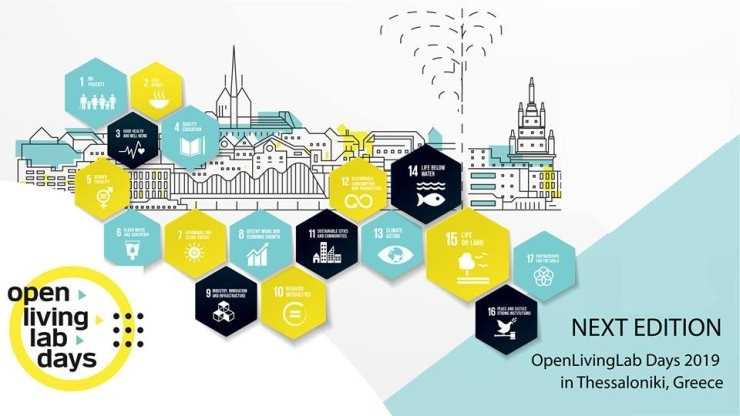If there is something that connects research, innovation, community and industrial and governmental ecosystems, then it is inspiration in Thessaloniki.
By following the three innovation development phases: exploration, experimentation and evaluation, Thessaloniki, the co-capital city of Greece, will become a place for its citizens with creative ideas, to experiment for improving their health and wellbeing in a time of urban growth. Usually local people don’t have the opportunity to contribute to designing products, “smart” places and services or they are often forgotten by the drivers of real-life decisions.
Living Labs are a totally opposite concept. They start by placing the communities into the heart of development and operate in a real-life context with an open, user-centered and co-creative approach.

Next September (from 3rd to 5th) Thessaloniki turns to a big ecosystem of “Ideas labs” by hosting, for the first time, the famous OpenLivingLab Days 2019. Living Labs from 30 countries, as user-driven projects conducted in a real-life situation, will for three days enable the end-users to create and develop products or services for themselves and their community, by exchanging knowledge, best practices and tools with companies, public sector and universities. A Living Lab is very diverse concept and could be found on a street, in a building, in a museum or in a gallery, within an organization or could include a whole city or industry, depending on the project.
“It’s important for scientists to listen to the communities”, says Dr. Evdokimos Konstantinidis, Member of the Administrative Council of the European Network of Living Labs (ENoLL), and of the Health Living Labs core group and continues: “by combining creative and spontaneous thinking with science, Living Labs can provide unpredictable opportunities for improving people’s lives. Like a kind of an open platform, the Labs accept creative original ideas from people of all backgrounds, combining in a workshop the experience with the true knowledge and needs of the world, for everyone’s benefit”.
The Living Lab concept originates from Prof William Mitchell from the MIT MediaLab and School of Architecture and City Planning in Boston and represents “a research methodology for sensing, prototyping, validating and refining complex solutions in multiple and evolving real-life contexts”. The basic idea is to include the users in the value-creation process and, in a wider use, to enhance innovation, inclusion, usefulness and usability of science and its applications in the society. The Living Labs concept adopted by European Union is defined as “user-centered, open innovation ecosystems based on a systematic user co-creation approach integrating research and innovation processes in real life communities and settings”. The Helsinki Manifesto (November 2006 Finnish EU Presidency) first pointed at Living Labs as a first step towards “a new European R&D and Innovation System, entailing a major paradigm shift for the whole innovation process”.
Living Labs have been characterized by Dave Carter, Manchester Urban Institute, University of Manchester, as “creative spaces for sharing technical skills and technical spaces for sharing creative skills”. The participation of end users as an equal partner with other network members allows the university research teams to develop their ideas faster. It is slowly becoming apparent that better research is produced when researchers and society work together. Health researchers in Greece often collaborate with patient associations to develop applications that will serve their needs because has became clear that “co-production” with society leads to better research, both technically and ethically, because it represents more actors and it is more equitable.
There are different models of Living labs focusing on different sectors like health and wellbeing, smart cities, health aging or urban mobility, etc., established with their own defined purpose and scope. Some concentrate on a particular facet of science or technology, others have a regional focus, aimed at solving local problems. The Thessaloniki Active and Healthy Ageing Living Lab, Thess-AHALL that is based in the north, for example, fosters initiatives that encourage the sustainability of regional development and healthcare systems by provision of novel technologies and innovations. This Living Lab represents the active one in Greece, one of the core members of ENoLL and it will host the OpenLivingLab Days 2019. The Lab is actively engaged with the end-users and relevant community stakeholders and actively pursues the co-creation and co-design of technological solutions for improved health and social conditions and facilitates independent living. It’s the ultimate goal to speed up innovation, collaboration, development and test more accurate services. This is achieved by the early involvement of users as co-creators. Thess-AHALL is lead and coordinated by the Laboratory of Medical Physics within the School of Medicine of the Aristotle University of Thessaloniki “[Thess-AHALL] exploits the Living Lab approach in research projects funded by the European Commission, while developing a business plan for self-sustainability, in line with the ENoLL’s strategy, facilitating the people demand with the active involvement and co-operation of both academia and SMEs (small-medium enterprises) within pilots” says Prof. Bamidis, Founder and Head of the Thess-AHALL, adding that “there is no “size that fits all” Living Labs, but they all share common approaches like active user engagement, multi-stakeholder participation, real-life setting, multi-method approaches and co-design, co-creation”.
The European Network of Living Labs (ENoLL), the international federation of benchmarked living labs in Europe and worldwide, was founded in November 2006 under the auspices of the Finnish European Presidency and the network has grown in ‘waves’ up to this day. It counts today over 130 active Living Labs members worldwide, including active members in 20 of the 28 EU Member States, 2 of the candidates and it is present in 5 continents in addition to Europe. Source: Euroscientist